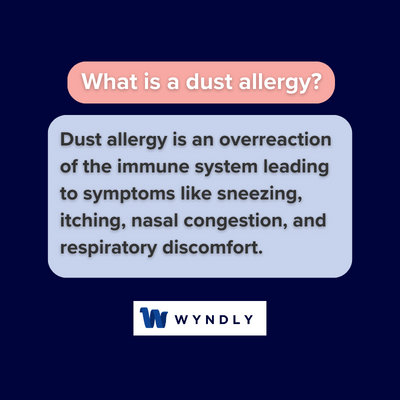What Is A Dust Allergy? Defining Dust Allergy

What can be found in dust that can cause allergies?
Dust can contain dust mite proteins that can cause allergy symptoms in those with a dust mite allergy.
What are some common symptoms of a dust allergy?
Symptoms may include sneezing, stuffy or runny nose, itchy or watery eyes, coughing, wheezing, and shortness of breath.
How can dust allergies be treated?
Dust allergies can be managed by avoiding exposure to dust, using allergen-proof bedding, regular cleaning, and taking allergy medications.
Are there any complications associated with dust allergies?
Prolonged exposure to dust allergens can lead to complications like sinus infections, asthma exacerbations, or eczema flare-ups.
Is there a cure for dust allergies?
Dust mite allergy symptoms can be effectively managed through avoidance measures, medication, and allergen immunotherapy.
What are some common triggers of dust allergies?
Dust mites are the primary cause of dust allergies, however, other allergens such as pollen, mold, and pet dander can also collect in dust and trigger allergies.
How can someone determine if they have a dust allergy?
If someone experiences symptoms like sneezing, nasal congestion, itchy eyes, or respiratory issues when exposed to dust, they may have a dust allergy. Allergy testing can provide a definitive diagnosis.
What are some ways to reduce dust allergens in the home?
To reduce dust allergens, it's important to regularly clean and vacuum the house, use allergen-proof covers on mattresses and pillows, wash bedding in hot water, keep humidity levels low, and minimize the presence of carpets, curtains, and stuffed toys that can collect dust.
Can dust allergies develop at any age?
Yes, dust allergies can develop at any age. It's possible for someone to be allergic to dust their entire life or for the allergy to develop later in adulthood.




